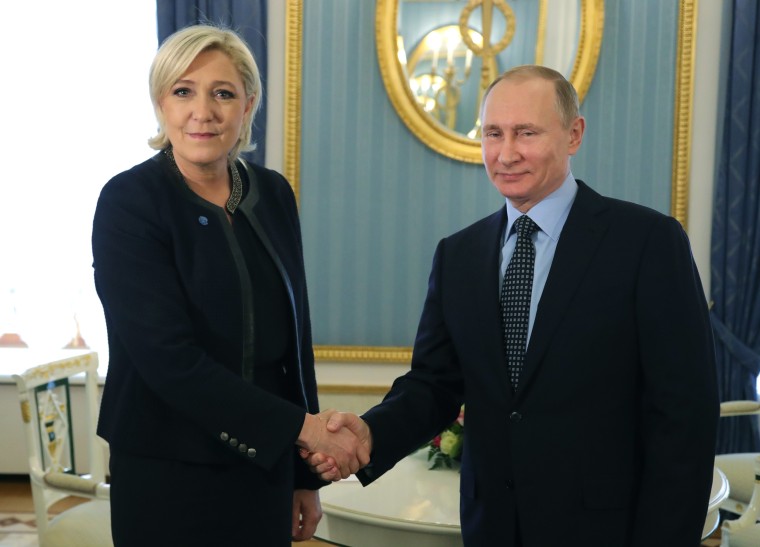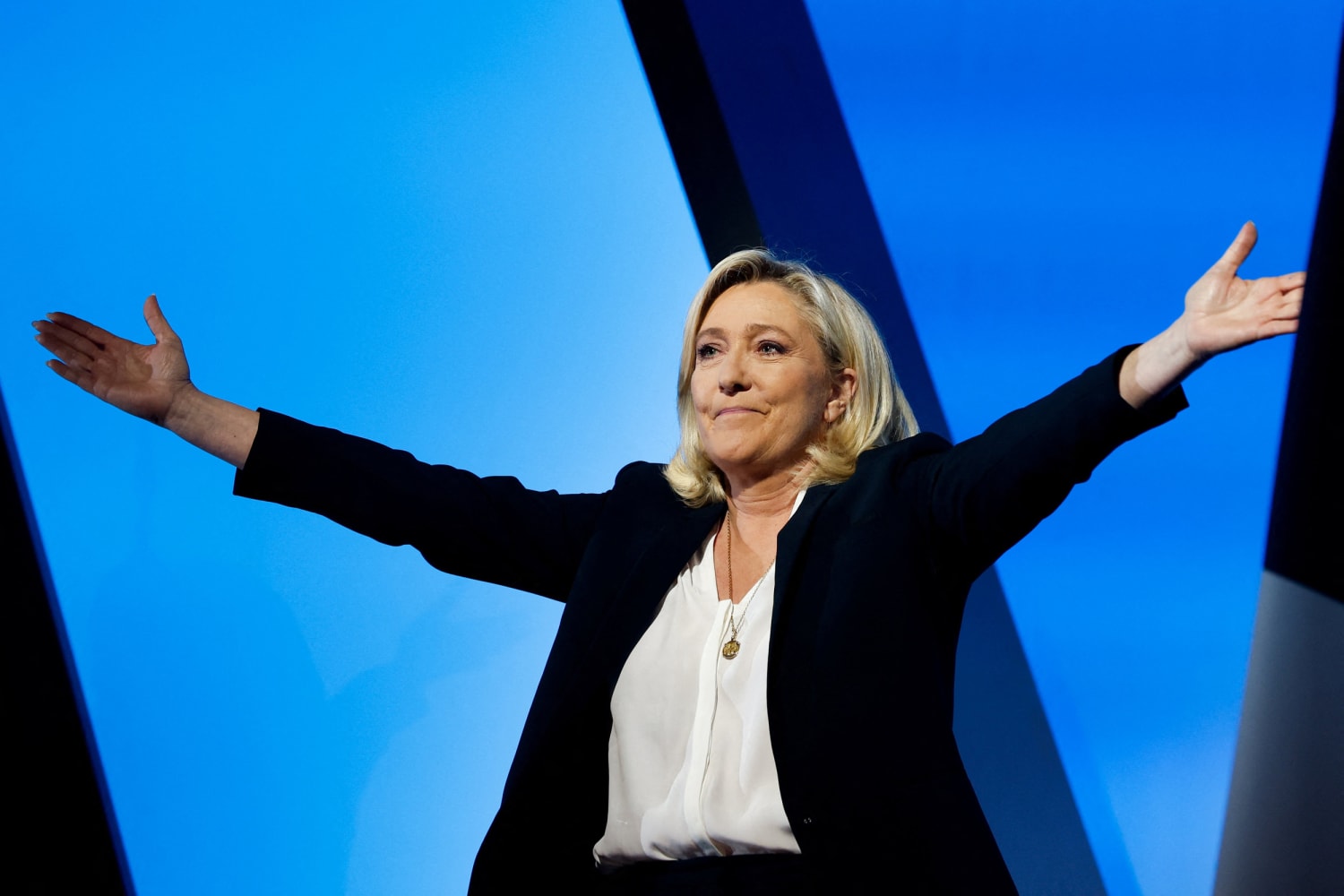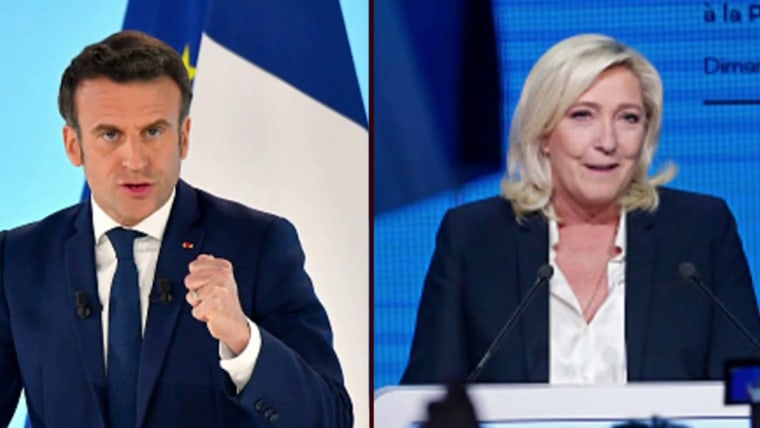Could Marine Le Pen be about to become France’s first far-right president?
Polls put the nationalist leader neck and neck with incumbent centrist Emmanuel Macron on Monday after the first round of the country’s presidential election, leaving Europe on edge for a result that could send shockwaves across the West.
The pair will now face off in a direct fight for power in the second round on April 24, a rerun of the presidential battle in 2017.
Back then Macron beat Le Pen by 66 percent to 33 percent. But this time it’s too close to call: A poll from iFop for the broadcaster TF1 on Monday showed Macron on 51 percent, a lead so slim it’s within the margin of error. Another poll, from research firm Ipsos, showed Macron on 54 percent — still well within striking distance for Le Pen, whose fortunes have risen as the campaign has progressed.
France and the wider European community are now facing the possibility of something unthinkable just months ago: A Eurosceptic, anti-immigrant French leader who has pledged to leave NATO and is seen as friendly toward Russia.
Le Pen, 53, is running for a third time and would become France’s first female president if she wins. The far-right leader has softened her public image in recent years in an effort to overcome traditional opposition to her candidacy.
Her party changed its name from the National Front to the National Assembly and she has sought to appear as a concerned patriot intent on addressing the rising cost of living for ordinary people while Macron, 44, has been focused on the war in Ukraine.
But her policy platform is no less radical.
Le Pen wants to ban Muslims from wearing headscarves in public and to drastically reduce immigration from outside Europe. She has pledged to hold a referendum to reduce the rights of immigrants and foreigners, giving priority for housing, jobs and social security benefits to French people — setting up a potential legal fight with the European Union.
Hers is an ideology traditionally seen on the fringes of French politics. Not any more.
“She is without doubt closer than she’s ever been [to winning]. In the last two elections I was asked again and again whether Le Pen could win it and I said ‘no, not a chance.’ This is the first time I’m hesitating,” said Rainbow Murray, a professor and expert on French politics at Queen Mary University in London.
In 2002 Le Pen’s father, the fervent far-right leader Jean-Marie Le Pen, caused a huge shock by getting through to the second round of the presidential race.
He faced conservative Jacques Chirac, who won a landslide victory with 82 percent of the vote as French voters across the political spectrum rallied against the far-right. Liberals and centrists may not be able to count on this “Republican front” holding firm again.
“There’s still talk about the need to block the far right but it’s certainly not what it was. And that’s partly because Marine Le Pen has been working extremely hard for more than a decade to tone down the party’s image,” said Murray.
“If you look at the policies, they haven’t changed that much — but she’s certainly a more media-friendly figure than her father was and a much more savvy figure as well. She knows how to charm the target electorate.”
One issue on which Le Pen may still be vulnerable is Russia.
She has spoken fondly of Vladimir Putin in the past, and more recently cautioned against imposing sanctions that could hurt the French economy. But her stance hasn’t featured as prominently in the election as some had expected in the wake of Putin’s Ukraine invasion.

“I think that’s partly Macron’s fault. He’s the one who should have been hammering her with it but he’s been too busy being the president and hasn’t spent enough time being the candidate. It’s a real weak spot, she’s got away with it,” said Murray.
Macron’s international focus has made France a leading voice in the politics of Europe, helping to steer it through crises such as Britain’s acrimonious exit from the E.U.
Le Pen’s election would put an end to that. Though she has stopped short of calling for France to leave the E.U, her plans would put her in the company of the likes of Hungary’s Viktor Orban, who faces condemnation from the Brussels establishment.
While Le Pen and Macron offer two competing visions for France, the election will ultimately be decided by voters who backed other candidates. Left-wing populist Jean-Luc Mélenchon, who came a close third in the first round, urged his supporters not to give a single vote to Le Pen. They now have the choice between a centrist, liberal incumbent or a far-right challenger — or to stay at home.
“Among politicians, the republican front is putting itself in motion,” said Mathieu Gallard, head of research at Ipsos France.
“It remains to be seen whether voters will follow.”
Source: | This article originally belongs to Nbcnews.com











